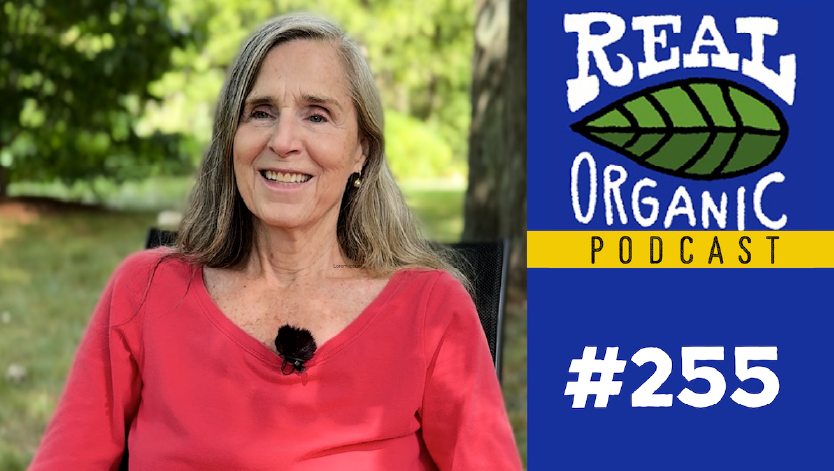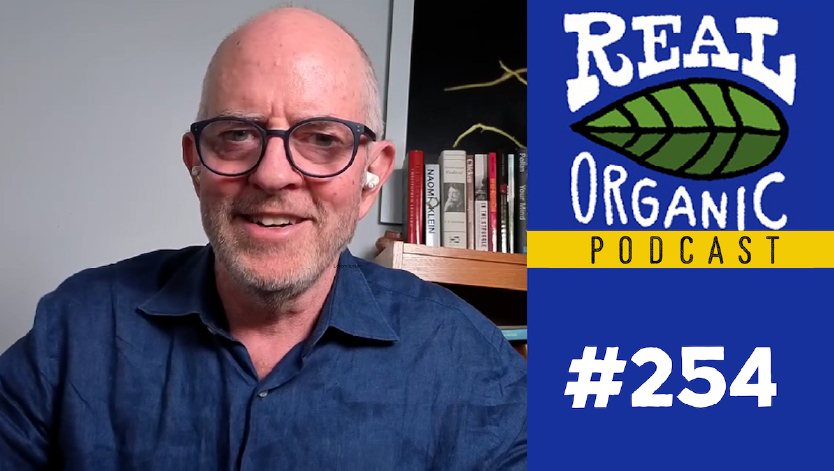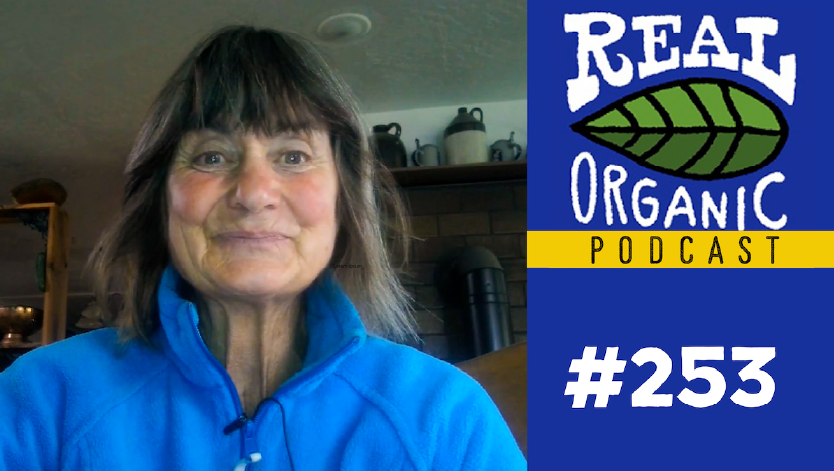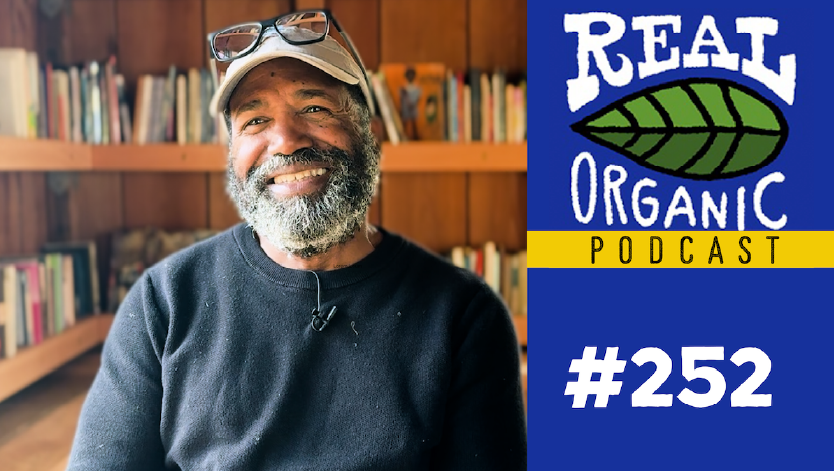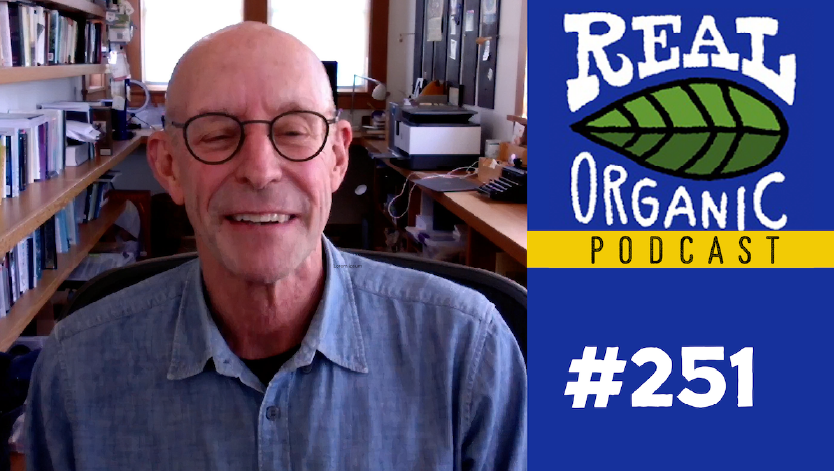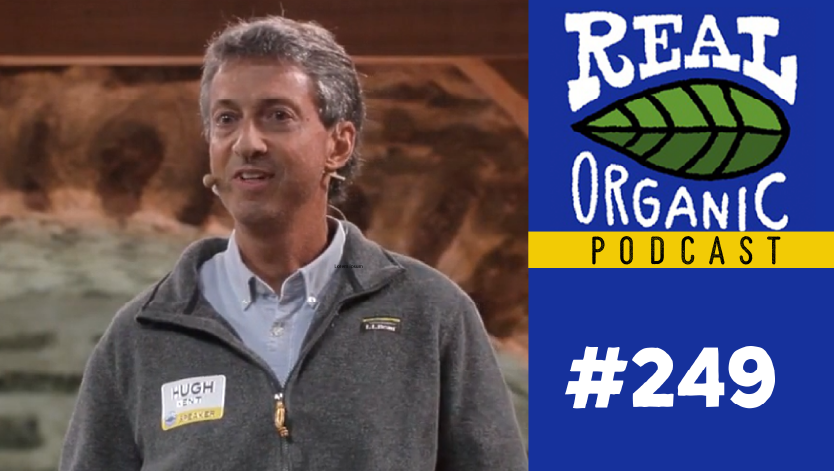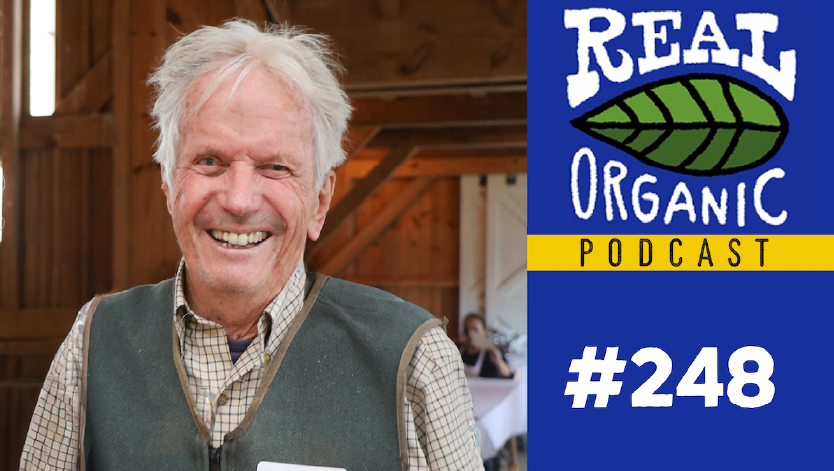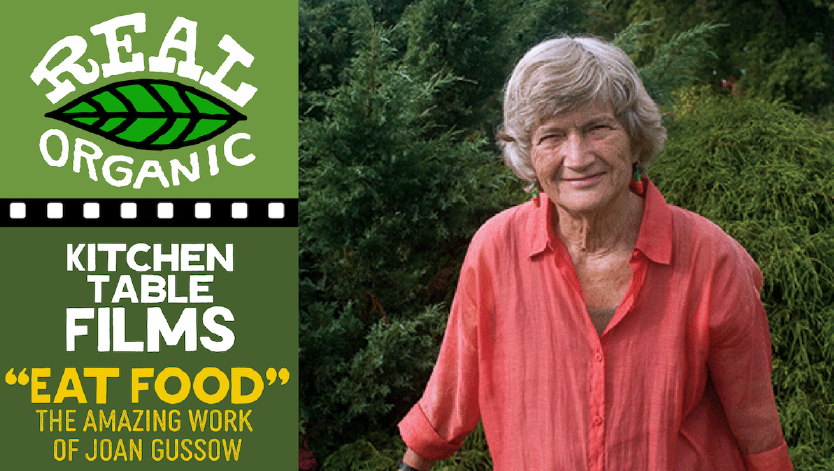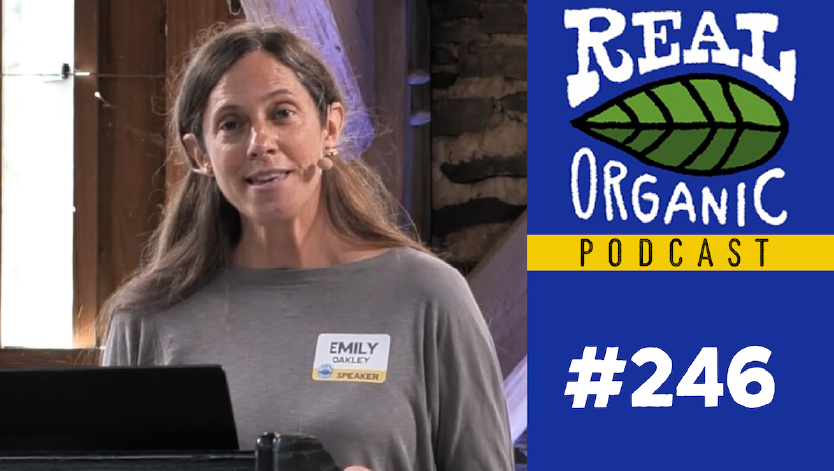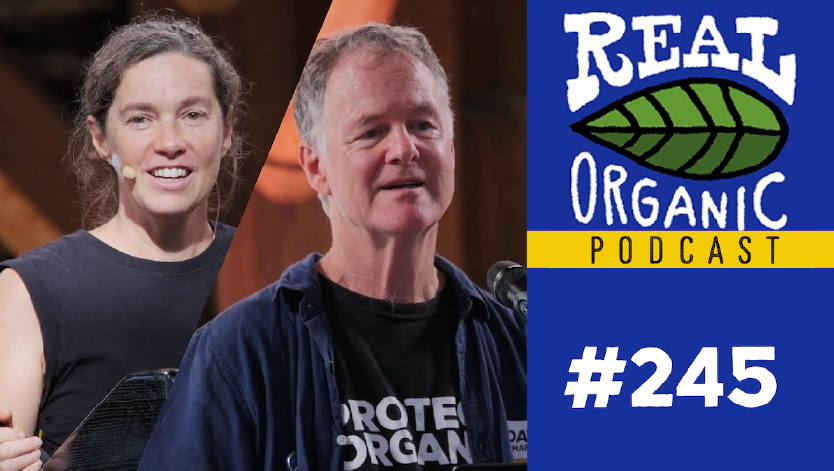Episode #250
Karen Washington: Food Justice and the Power of Community
Dave Chapman sat down with Karen Washington, longtime food justice advocate, community gardener, and co-founder of Rise & Root Farm in New York’s Hudson Valley this past summer. Karen shares stories of her friendship with the late Joan Gussow and their shared mission to confront inequity in America’s food system. From her early work with Just Food in New York City to building a cooperative farm that connects people to land and healing, Karen speaks with honesty, humor, and grace about the fight for food as a human right. Her vision is one of community-driven resilience – neighbors feeding neighbors, farmers supporting farmers.
Our Karen Washington interview has been edited and condensed for clarity:
You can subscribe and download episodes of our show through your favorite podcast app, our YouTube channel, or stream the audio-only version here:
Dave Chapman interviewed Karen Washington virtually on August 29, 2025.
Dave Chapman 0:00
Welcome to the Real Organic Podcast. I’m feeling privileged to be talking with Karen Washington today. Karen, thank you so much for doing this. We’re talking about your work, and about Joan Gussow and your friendship with Joan. How did all that happen?
Karen Washington 0:20
I met Joan while we were on the board of Just Food at the time, and really didn’t know how, in terms of being a celebrity she was, because she was really, really down to earth. She gave a lot of wisdom, and knew a lot about the food system.
Karen Washington 0:22
I was just a neophyte at the time, and just hearing her navigate what was happening in real time around the food system intrigued me. I talked about, in her own backyard, how she was growing food and how her relationship to land and food was so important to her. As I started my journey in the food world, I would talk to her about some advice.
Karen Washington 1:14
One day she said, “Karen, I want you to come and visit me, but I don’t want you to come alone. I want you to come and bring your community gardeners.” At that time, I was telling her how community gardening was, especially in low-income neighborhoods, and neighbors of color often don’t get a chance to go outside their comfort zone.
Karen Washington 1:37
So, she said, “Karen, I want you and your gardeners to come for lunch.” Most of my gardeners did not speak English at all and mostly spoke Spanish, but I was able to convey to them that we were going on a trip to visit a friend.
Karen Washington 2:08
She was incredibly nice. She was just so warm. She made everyone feel so comfortable. We left with so much joy and love. Right then and there, I knew she was going to be a friend for life because of the kindness that she showed me and my fellow gardeners.
Dave Chapman 2:17
Can you explain what Just Food was as an organization for people who don’t know?
Karen Washington 2:24
Just Food was an organization, and the main focus and mission was on food justice, making sure that communities were being seen and heard. They were able to really work on community organizing skills for food systems and food organizations, especially at a time when there was so much conflict around garden preservation, but people didn’t really have the tools to help guide them in terms of standing up for their gardens.
Karen Washington 3:04
So, Just Food not only did that, but also was at the forefront of community-based farmers’ markets, getting communities to look at their food system: What is it that they need? What is it that they want? And then giving them the tools to ask for it.
Karen Washington 3:21
I remember Just Food starting a community-based farmers’ market. They also started a program to teach people to become chefs. I’m going to take that back – not to teach people because people already knew, but to give them support so that community residents could then help communities prepare food.
Karen Washington 3:48
It was an excellent organization, really at the forefront of the food world at that point in time, because it really centered on communities that were less fortunate, not affluent communities, but communities that were less fortunate. It was able to give them the tools to be self-sufficient and self-reliant.
Karen Washington 4:14
I think that’s what I liked about Just Food. They didn’t come in and try to control the narrative around food and people’s community. It was like, “We are here. How can we help?” instead of “We are here and we’re going to show you what to do.” No. It was like, “We are here. Let us see how we can help you.” I think that’s why Just Food was so important at that time.
Dave Chapman 4:40
About when was this? When did you go to Joan for lunch the first time?
Karen Washington 4:43
This was in 1990s, early 2000s.
Dave Chapman 4:53
This was based in New York City?
Karen Washington 4:55
Based in New York City, the office was down in Midtown Manhattan at the time, but its roots stretched across all five boroughs of New York City. So it wasn’t isolated in Manhattan, but branched out throughout all five boroughs.
Dave Chapman 5:21
I want to come back to that in a little bit, but I want to go back to that day that you went out to Joan. I’ve been to Joan too. I interviewed her there. It was lovely. She was such a lovely person, and I think also so significant. How many people came out for lunch that day?
Karen Washington 5:47
It had to be about 16 of us.
Dave Chapman 5:50
Wow. Big spread.
Karen Washington 5:52
Yes, because the gardeners brought themselves and their children. They couldn’t leave their children behind, so they came with their kids.
Dave Chapman 5:59
That’s great. What happened after that? You got to know Joan better?
Karen Washington 6:06
Yeah, got to know Joan pretty much better. Like I said, there were things going on in the food world. I think people were just looking at the food system in a more cohesive and broad-based way, and looking at the fact that many people were struggling to have access to healthy food.
Karen Washington 7:03
This was a point in time where people were starting to see there was a have-and-have-not food system. People with power and privilege had better food than people in low-income neighborhoods. So, how do we first acknowledge that, and then how do we bring it to the forefront? Then, how do we find remedies to make sure that food as a human right is fair and just?
Karen Washington 7:03
As a board member, we had to tackle issues around funding and around organizations that we supported at the time to make sure that they were doing the right things. They were doing the right things. We were a very proactive board, and we weren’t a board that just was able to agree and have money being put into communities.
Karen Washington 8:18
We had a great director at that time, Jacquie, and during board meetings, the staff would come and talk about the programs that were going – that Just Food was running in different neighborhoods. We were able to sit down and listen to find out exactly what the programs were, what the need was, and how, as a board, we could support not only the director, but also the staff. I think that was important.
Karen Washington 8:18
One thing about Joan, which I really liked, is that she raised a lot of questions about what was going on in communities, and how resources were being spent, which is really important. Then it came a point in time when things started to change and she said, “Karen, things are changing. I think it’s time for me to step down.” But we still remained friends after that.
Dave Chapman 6:31
What was that change that she felt it was time?
Karen Washington 8:43
Jacquie Berger, who was the Executive Director for so many years, decided to step down, and then we had another Executive Director come in and was there for maybe a year or so. Then again, I think it was the Executive Director changes that made her decide that it was just time for her.
Karen Washington 9:19
She’s been on the board, I think, from the very beginning. I think she just felt that with change, new voices and opinions come about. But she told me something. I’m going to keep it a secret – she gave me some good advice that I should have listened to, but I didn’t.
Karen Washington 9:44
That’s something that, I wouldn’t say haunts me, but I would say to myself now, as an elder, is that sometimes you have to listen to what your elders have to say, because they have a lot of wisdom. You think you know it all, but sometimes you don’t. I will cherish that moment. I will cherish those words that she gave me. If I could do it all over again, I would have, but in hindsight, I didn’t.
Dave Chapman 10:18
I interviewed Barbara Kingsolver last week about Joan, and I asked her, “Well, what did you learn from Joan that came into your books?” She said, “Actually, I knew a lot of that part. What I learned from Joan was to stand up and speak the hard truth.” She said, “I was raised to be very polite and nice, but sometimes you can’t be.”
Karen Washington 10:50
That’s what my downfall was, because it was a situation where I, again, was trying to be nice and made a decision that I have – that I regret. But she saw through it. She said, “Karen, I’m going to give you some advice. I don’t think you should be doing this. You shouldn’t go this way.”
Karen Washington 11:14
Then I was saying, “Well, I think this person needs a chance.” She said, “No, no. It’s not going to be good.” Within a year’s time, it wasn’t good. She saw through it. Again, she had that wisdom. She saw through people. She knew who was fake and who was real.
Karen Washington 11:39
One thing about Joan, too – Joan was hard. To be close to her or in her circle, she valued real, authentic people. She knew people who were phony, and she would not allow them in her circle. That’s one thing I learned from Joan.
Karen Washington 12:02
As I continue to move in these spaces, there are people who admire you for what you do, and they try to get next to you, but they’re not really authentic. They’re just trying to bask in your celebrity. But with Joan, if you are a friend, you were a friend for life.
Karen Washington 12:25
As a matter of fact, I was looking at – I think I have some emails. I think the last email that I got from her was 2023, I think. I was looking back; we were just talking about getting together. You know what hurts too, Dave, is that when I had heard that she was doing well, I had gone to a lot of her friends in particular.
Karen Washington 12:54
I said, like, to Mark Bittman, “You know what? Let’s all get together and surprise Joan.” I think it was one of her birthdays, and celebrate, because you never know what will happen. I regret that that didn’t happen. I really, really regret that didn’t happen.
Karen Washington 13:12
Something like that, you gotta live with. But I do cherish the fact that I knew her. I called her my friend. She called me her friend, and the loss was felt. The loss was felt among so many people that she touched. She will be greatly missed. What I have to do is make sure that I stand up, I’m direct, and I carry on that fire that she had.
Dave Chapman 13:49
As the elders die, the next generation becomes the elders, with all the opportunities and responsibilities.
Karen Washington 13:58
True, yeah.
Dave Chapman 14:02
She stayed a long time.
Karen Washington 14:04
She did, but she had work to do, and then when the work was done, it was like, “Okay, I’ve done the best I could, and I left an imprint on a lot of people to carry on the work.”
Dave Chapman 14:21
In that board of Just Food, was there a particular point or attitude that she had that she was trying to impress on people, that they maybe didn’t get right away?
Karen Washington 14:35
Yeah. When you’re on a board, you’re in a room with so many different personalities making decisions. She was well respected, so a lot of times it was like, “So what does Joan think?” Not that people’s voices were invalidated, but it came a point in time whereby she knew the food landscape at a time when it was just coming to the surface for a lot of us, but she’d been in the trenches for so long.
Karen Washington 15:13
Just to hear her experience on how things were in the real world was great. I was new to the food system at the time. I was able to contribute from more of a community-based level because of what people were talking about – I was living that. People were talking about poverty and underserved communities – I was living that.
Karen Washington 15:49
I guess I brought that to the board, but Joan brought a lot of influence. She knew about people who were doing food businesses, growing food, food projects, chefs, writers, donors, and educators. She knew all those, so she had a wealth of information because she’d been out there. She lived that all her life, bringing that to the table.
Karen Washington 16:24
There were times where we would sort of, I wouldn’t say battle, but there were always different opinions. That’s what’s good about boards, because you don’t want to be on a board where everybody is yes, yes, yes, just so they can leave. You want to be able to sit down and talk about how things are going, how the organization is going, and how the funding is going.
Karen Washington 16:51
I’m learning that now – the financial aspect is our responsibility as a board. We have to make sure that not only are we talking about programs, but also analyzing the health of the organization, the fundraising aspect, and the budget.
Karen Washington 17:10
That’s another thing she was good at too. Line items of the budget – how money is being spent – is crucial. I’m learning that now, as I’ve been on so many boards, and I understand the fiduciary responsibility that comes with being on the board and not taking it lightly.
Karen Washington 17:34
Sitting down and going through line items to find out exactly what this is for, what do you need, how’s the fundraising going, and who we know that we can tap to get funds – having those conversations. Also, how’s the staff? How are things at the staff level? What programs are working, what are not working? Who is not causing trouble, but who is difficult?
Karen Washington 18:07
But Just Food had a great staff. It really had a great, great staff, so that wasn’t the problem. It’s just making sure that there was funding. I think that’s where a lot of the conversation went – the budget items after we heard exactly how the program was doing and how the organization itself was doing.
Karen Washington 18:34
How things have changed now? In this time and day, things have changed tremendously. Going out there now, in this time where so many things are being challenged – the word justice itself is being challenged, diversity is being challenged, inclusion is being challenged. These words that we were fighting for are being challenged. It just gives you food for thought.
Karen Washington 19:15
Then, how do we pivot in a way that we continue to value the work that we are doing, especially for people who are in some ways being targeted? Things are different now. We just have to fight. We really have to make sure that we fight for our justice, our freedom, for who we are, for our diversity, for this country, and for people who may not have the ability to feed themselves.
Karen Washington 20:00
This is a critical moment right now, and it’s going to take a village, and a community to come through to make sure that at the end of this crisis, this chaos, we’ll still be standing, and we’ll still be a country known as the United States of America.
Karen Washington 20:19
I hate to say that, Dave, but we’re at a critical point in time where we’re seeing people with power and privilege exercise it in such a way that there’s silence, and it’s like, “What are we doing?” There’s a bully, and the bully is just trying to change systems and the way people live, and we need to combat that.
Dave Chapman 20:59
Yeah, I’m with you. Can I ask about the organization that you’re now working to develop and support? What is that called? What organization is your heart’s organization right now?
Karen Washington 21:18
I own a farm with four of my friends. It’s a for-profit farm. We now have a little side nonprofit work because we do education, but for me, it’s growing food and feeding people. For me, that’s the most important thing – to be able to be close to the land.
Karen Washington 21:43
We’re at Chester Agricultural Center up in the Hudson Valley. We’re in the Black Dirt Region. What does that mean? The land is so sacred. Black dirt means that it’s rich in organic matter. Usually, soil is 3–5% organic matter. We’re at 20%, close to 30%.
Karen Washington 22:12
So, number one, to be thankful to be able to grow food for that, but then also to grow food in a way that our intention is to make sure that every human, regardless, has access to the food that we grow. We just got certified organic, which is a big deal.
Karen Washington 22:36
The name of my farm is Rise & Root Farm. There are four of us. Two of us are women of color. Three of us are LGBTQ women. We all come from community gardens in New York City. All four of us were part of Just Food. We came from Just Food, too.
Karen Washington 22:55
We brought our heart, we brought that mission, and we put it into the soil so that we grow food so that everybody, no matter what, can have access to healthy food. That’s where my heart is, but I do have other organizations that branch off that I continue to work with.
Karen Washington 23:27
I just started a couple of years ago the Black Farmer Fund because of the fact that farmers in New York State – out of 52,000 farmers, only 139 are Black. So just making sure that there’s a level playing field of financial wealth that can be shared, and opening up the conversation about the wealth disparity we have in this country, especially when it comes to agriculture, not only in terms of monetary wealth but also land.
Karen Washington 24:18
Right now, as a Black farmer, we only own 1% of agricultural land in this country. Those are the things that I look at. I really look at the inequality that’s happening, and I try to get people to realize that food is a human right.
Karen Washington 24:44
Food, water, and shelter are human rights. The question I ask time and time again, Dave, is why, in this great country…? I love America. I see before January of this year, how it was going in a good direction, embracing its diversity, its heart, trying to help people.
Karen Washington 24:42
The question that I would ask is, why do we have hunger and poverty? Why is it? What’s going on in this system? Why do we have homelessness? You can go to work in New York City, and you can literally step over people while you go to work, and that doesn’t affect you? Or people sleep on the subway or on a church step, and that doesn’t affect you? It’s not being addressed.
Karen Washington 24:42
I continue to trigger my humanity in a way that makes sure I continue to ask those hard questions. I will continue to ask those hard questions until hunger is no more.
Dave Chapman 26:28
It’s like that Buddhist vow, which is, “I will continue until all suffering has ended,” and we don’t see that end in sight. So, it’s a commitment for a very long time. Can I ask, for your farm, who are you feeding? Who are your customers?
Karen Washington 26:48
We have a connection to a community center that I belong to and continue to be on the board of, which is the Mary Mitchell Center in the Bronx. They run a farmers market that I helped start back in 2004, and it’s still going strong, La Familia Verde Farmers Market, out of Just Food.
Karen Washington 27:13
It was the first community-based farmers market that wasn’t a Greenmarket, but was literally a farmers market started by community gardens. Now, let me tell you something. In 2004, when that happened, people thought we were crazy. Just Food said, “Come on. We can do this.”
Karen Washington 27:32
First of all, we had to get permits. We had to buck up against the big Greenmarkets that were already out there and try to get a place. We found a location inside a park, so I had to go to my community board to get permission through the Parks Department to get access to that place for the farmers market from July to November.
Karen Washington 28:04
I also had to go to the Department of Transportation to get signs that said “Farmers Market, Drivers Only.” It was a lot. Then I had to go through Ag and Markets to acknowledge the fact that we were five community gardens, but we were a farmers market cooperative. The five community gardens acted as one farm to be recognized. That was through Just Food, getting all those through Just Food.
Karen Washington 28:41
Now, there are community-based farmers markets. I think at the time I left, there were 20 community-based farmers markets throughout New York City, and it continues. Just Food did it. Like I said, we come from community gardens, and we’ve been here. This is our 11th year. We just celebrated our 10th anniversary last year. We supply food to the Mary Mitchell Center in the Bronx.
Karen Washington 29:13
Also, we have a food pantry here at the Guild of St. Margaret. We supply food to their soup kitchen and food pantry. We do farmers markets, but our farmers markets are now only from March until June.
Karen Washington 29:38
Then we grow the starts – the transplants, beginning plants – for all the community gardens in New York City through the GreenThumb program. We do a lot of hard work, but it’s good for us. We feel so grateful and thankful that we have this opportunity to do that.
Karen Washington 30:01
That we did not leave our community behind, that we didn’t go into high-end markets or feed high-end people. We wanted to make sure that if we came from grassroots, we were going to go and feed grassroots organizations. So, we feel good about that.
Dave Chapman 30:22
Karen, were you part of that program that was just discontinued this year? I knew a farmer out in the Midwest, and a quarter of her farm was dedicated to supplying food pantries and schools. It was a big deal when it got dropped.
Karen Washington 30:41
The USDA Food Program, yes. Maybe, if the rural farmers… The big commercial farmers don’t need those grants. It’s the small farmers who needed those grants to help us. What has happened now is that… that was federal money, and so there are some programs that have closed because of that, but what we’re trying to do is see if the state will take on that responsibility.
Karen Washington 31:35
In some instances, like in New York, the state has come up with some funding. Again, we pay taxes, so why is that your money? That’s our money. Again, we need some more powerful people to negotiate that for us. As long as it doesn’t affect the farms and farmers that make a lot of money, then they’re not going to back us.
Karen Washington 32:20
I would like to see that. That’s one thing I don’t understand. This is my own interpretation: when you’re a farmer and you care about your crop and animals, you should also care about your other farmers. If your other farmers are hurting, then you should be out there fighting for your other farmers.
Karen Washington 32:48
I don’t see that happening. I would like to see that happening, because being a farmer, to me, is unique, because you’re caring for something – you’re caring for the earth, you’re caring for your animals. But what I don’t see, and I don’t see the outcry, is that those farmers who are out there sustainably making money, and you have small farmers that are hurting, where is the outcry for the government and for people to help those small farmers?
Karen Washington 33:21
I don’t know. It may be wishful thinking that somehow, there’ll be a light switch that farmers will say, “Wait a second. We’re a holistic group trying to make the world a better place, and we have a segment of the population of small farmers that are hurting. So, how can we help those small farmers?”
Karen Washington 33:45
I would like to hear that. Maybe one day it will happen, but in the meantime, we have our community that’s keeping us afloat – our local community. I think as we maneuver the next couple of months and years, it’s the community at large that’s going to help us get through this.
Dave Chapman 34:10
The people are coming together. They support this and want this to continue.
Karen Washington 34:16
Yes. At this point in time, I’m saying to people, don’t focus on what is happening at the national level. Let’s focus on what we can do locally. Because right now, it hasn’t hurt us yet, but as these tariffs come in, and with people who relied on SNAP and food stamp money being cut, and people’s medication being cut, now is the time for us to act.
Karen Washington 34:48
We need to find out within our own community who are the people who grow food, cook food, can drive, who are the plumbers, who are the electricians, and who is the babysitter. All these people – how do we then connect so that we are relying on each other in times of need? Who can cook that extra meal when we know that a family doesn’t have food to eat?
Karen Washington 35:29
Who can drive or take the kids to school when we know that the family’s car doesn’t work? Who needs a handyman when the lights don’t come on? Now is the time for us to look beyond ourselves, come together as a community, and bring to the table, “This is what I can do. This is the help that I can give.”
Karen Washington 34:24
I hope that with this happening, it creates that ecosystem, as I call it, of people coming together and helping each other out. Maybe, in hindsight, this will be something that brings us through and continues to grow. I hope so – social capital and communal wealth.
Dave Chapman 36:14
We get to take it for a spin, don’t we? To find out what we can do under this kind of pressure.
Karen Washington 36:36
What would Joan do?
Dave Chapman 36:38
That can be our motto…
Karen Washington 36:48
I could hear her now. Under these circumstances, she would not hold back.
Dave Chapman 36:59
How would you get together with Joan after she wasn’t on the Just Food board? Would you go visit?
Karen Washington 37:09
No. You know what? To be honest with you, we did a lot through email or on the phone. I didn’t get a chance to go back again to visit her, but we did keep in touch. We would talk on the phone or we would email.
Dave Chapman 37:33
She was remarkable. I think she stopped teaching when she was 93 years old. That’s amazing. Her teaching was pretty amazing, from everything I hear. She really kept going.
Karen Washington 37:49
That’s what I said. What would Joan do if she was here? But she left an imprint on all of us. So, we take a little bit from what she gave us and go with it. I’m pretty sure her students, the people that she met, she gave a little bit of herself to all of us. The bottom line is to stand up and fight for truth and not be afraid to do that. I think she leaves that behind for all of us to do.
Dave Chapman 38:22
I went to the memorial at Columbia after she died, and it was just marvelous. There was this whole chapel filled with women. There were a few guys, a few of us there, but so many women who had studied with her, taught with her, and students who had become teachers after her. It was very lovely.
Karen Washington 38:45
Yes, she did plant a lot of seeds. She left this earth, leaving behind a legacy that will continue. A lot of people can’t say that, but she did. No regrets. She lived a good, fulfilling life. She touched so many people’s hearts. So many different people. I’ll cherish that. I cherish that relationship that I had with her.
Dave Chapman 39:23
How far from the city is your farm?
Karen Washington 39:25
An hour and 15 minutes. I tell people going from New York City to my farm is faster than going from the Bronx to Brooklyn. It’s a nightmare, or to Queens. Right across the Tappan Zee Bridge, up towards Harriman, exit 16 on 87. I tell people, “You know where Woodbury Commons is, this big shopping mall?” Then I say, “Three exits afterwards.” “Oh, that’s where you are.”
Dave Chapman 40:08
Have you developed a community in that town – in that region?
Karen Washington 40:18
Yes and no. In terms of community, we have a watering hole called Rushing Duck where we tend to meet. The community that we live in is the Hudson Valley, and the Chester Agricultural Center is the land that we lease.
Karen Washington 40:45
Now we have 13 independent farms, but we work collaboratively, and so we share our resources, knowledge, and tools. We, the farmers meet once a month just to talk about how it’s going at the Chester Agricultural Center and what our needs are. It’s a very good program.
Karen Washington 41:16
From the very beginning in 2014, a group of investors bought over 200 acres of land to help the next group of young farmers to farm. A 30-year renewable lease. I would be 100 years old then, but the idea is to encourage the next generation of farmers to farm on this beautiful, sacred land.
Karen Washington 41:56
I wish it could be replicated elsewhere, or that people with power and privilege who have land would want to help the next generation of farmers. This is what the Chester Agricultural Center is doing now. At first, it was a for-profit, because the investors thought they could make money with farming. It didn’t.
Karen Washington 42:19
Now it’s more nonprofit. They realized farmers are struggling, so if you thought you were going to make money off of us, that wasn’t happening. So, now it’s a nonprofit. Like I said, there are 13 of us. We meet once a month, and that’s our community.
Karen Washington 42:39
We have community days the last Saturday of every month, when we invite the community to come up and visit our farm. Because the first couple of years, it was crazy, since we’re so popular in New York City that everybody wanted to come up. It was like, “Wait, we are a working farm.” So, we came up with a solution.
Karen Washington 43:06
The last Saturday of every month, from 10:00 am to 1:00 pm, you can come up and visit. From 10:00 am to 12:00 pm is a farm tour and activity, and from 12:00 pm to 1:00 pm is lunch and Q&A. People can be satisfied and come see us.
Dave Chapman 43:27
That’s part of your farm’s mission – to help connect people to the farm.
Karen Washington 43:33
Without a doubt. Connect people who’ve never been on a farm, who’ve never seen women farmers, who’ve never seen Black or queer farmers. Our farm is a healing farm. We tell people in crisis, if you just want to sit and look at the fields, or you just want to put your hands in the soil, or you just want to take off your shoes and put your feet in the soil, you can do that. No questions asked.
Karen Washington 44:03
You’d be surprised how many people who’ve never been on a farm. I used to do some education at a homeless shelter, and they had a kids program. I did that for a couple of years, and I would invite the kids to get on the bus to come visit the farm.
Karen Washington 44:31
Oh, my goodness, those kids had never been out of the city, and to see them run back and forth, and back and forth, they would say to me, “Can we live here? Can we stay here? I don’t want to go home.” On one hand it made me happy, on the other hand, it broke my heart.
Karen Washington 44:53
I don’t take where I am for granted, because there are so many people who would never have the ability to leave the city, never be able to visit a farm, see what I see, or feel what I feel. I don’t take it for granted.
Karen Washington 45:17
It’s very spiritual for me being on this land, and I don’t take it for granted. I give it gratitude each and every day. When I go out there on that field, I ask for permission, and I give gratitude to be able to work on this farm, because it’s a gift.
Dave Chapman 45:37
Karen, how did you come to be a farmer? How did that happen? You didn’t grow up in a farm family.
Karen Washington 45:44
I grew up in the projects. No one was a farmer, nobody. I think it was divine intervention. I think also the fact that I had a profession that cared for people – I was a physical therapist – and so my relationship to my patients was just an easy move forward to have a relationship with the land. I look at it like that.
Karen Washington 46:13
I took care of my patients. Now I’m taking care of the land. I’m growing food. I cared about my patients in terms of what they were putting in their bodies, because I worked in underserved communities.
Karen Washington 46:27
It was so funny, because I would walk in prepared to do my program, and during my initial evaluation, I would say, “I need to go into the kitchen.” They would say, “You’re the therapist. We didn’t mean for you to go into the kitchen?” I said, “I can’t treat you if I don’t know what you’re putting in your body.”
Karen Washington 46:45
Most of my patients were hypertensive and diabetic. So, I would go in the refrigerator. I would see the soda, the cookies, and ice cream in the cabinets. I’d say, “Come on. You know you’re not supposed to eat that.”
Karen Washington 46:53
Like I said, I was running the farmers market. I said, “You know what I’m going to do? Next time I visit you, I’m going to bring you some fresh fruits and vegetables, because this is what I’m growing.” I had that relationship with my patients. I had a great relationship with my patients because I valued their health.
Karen Washington 46:59
Then when I hit 60 years old, I said, “Okay, now it’s time for me to go and follow my dream.” And I did. So, I’ve been here since then, following my dream.
Dave Chapman 47:33
That’s great. When you were taking people fruits and vegetables, did they go, “Oh, my God. This is pretty good.” Or did they go, “I don’t want to eat that?”
Karen Washington 47:45
They went, “Oh, my God. It’s pretty good,” because most of them grew up on farms. When I would tell them that I wanted to be a farmer, they would say, “Oh, Miss Washington. How could you? It was so hard.” They had a negative connotation when it came to farming.
Karen Washington 47:45
But then when I brought the food and we started talking about it, they said, “You know what? You’re right. We used to grow this all the time, and we were never sick a day in our lives.” We got everything from the farm: our medicine, our food.
Karen Washington 48:17
Just having that conversation with them, and then I would ask them, “Tell me more. Tell me more about how it was wringing a chicken’s neck. Tell me how it was growing corn and carrots. Tell me how it was cooking this meal.” I had a great, great conversation with my patients, with my elders that grew up on farms.
Karen Washington 48:40
I would ask them, “Tell me the stories.” They would sit and tell me the stories, and it brought back good memories. Instead of, “Miss Washington, why do you want to be a farmer?” for me to sit there and hear those stories made a difference in my life.
Dave Chapman 49:01
All right. Listen, this is fantastic, but I try to keep this to an hour. Do you have any last words you’d like to say about anything?
Karen Washington 49:20
No. I just want people to understand that we are going to get through this. Find joy in your life, find humility in your life, surround yourself with positive people, surround yourself with people who are trying to make a difference, and we will get through this together. That’s what I have to say.
Dave Chapman 49:47
All right. Well, thank you for saying that.
Karen Washington 49:51
Okay. Thank you, Dave.


